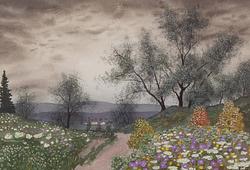Estrid Ericson
A pewter lidded jar with an amethyst finial, Svenskt Tenn, Stockholm 1972.
Maker's mark Stockholm X9. Height ca 17 cm.
Provenance
Hildur Hansson (1912-1999).
Hildur Hansson was born in Southern Sweden. Eventually she was married to Erik Hansson (b. 1906) but unfortunately she was widowed when Erik died in the Finnish Winter war 1930-1940. Hildur was left with their only child, Ingemar. Hildur Hansson had early on become good friends with Estrid Ericson (1894-1981), founder of Svenskt Tenn, and hence started to collect objects from Svenskt Tenn. An interest that continued over the years and their home was filled with some very special pieces of pewter as well as furniture from Svenskt Tenn. When Ingemar Hansson grew up he continued to cultivate the interest for items from Svenskt Tenn he had inherited from his mother. The collection comprises lots nr 329-377
Designer
Interior architect and designer Estrid Ericson founded, together with Nils Fougstedt, the company Firma Svenskt Tenn in 1924. Initially, they designed innovative pewter objects and employed designers such as Björn Trägårdh, Uno Åhrén, Anna Petrus, and Tyra Lundgren. In 1927, Svenskt Tenn moved to Strandvägen in Stockholm, expanding its business to homewares, furniture, and textiles. During the first years, Åhrén and Trägårdh designed the furniture at Firma Svenskt Tenn. Still, this era ended when Estrid began her successful collaboration with Austrian architect Josef Frank in the early 1930s. Estrid Ericson had a unique position within interior design and drew inspiration from her many trips abroad.
Read more











































